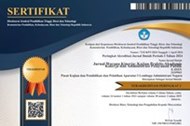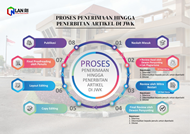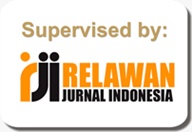Optimalisasi Pelatihan One Stop Learning (OSL) dalam Rangka Peningkatan Kompetensi Pegawai Negeri Sipil
Abstract
To improve organizational performance, it is necessary to have qualified employees with high levels of competence, enabling them to contribute effectively to the achievement of organizational goals. Based on this rationale, this study was conducted to examine the effect of optimizing One Stop Learning (OSL) training on employee competency at the Human Resources Development Center for Apparatus (PPSDMA), under the Ministry of Energy and Mineral Resources (ESDM). The study population comprised employees who had completed One Stop Learning training across five training programs with the highest levels of participant interest. The total population consisted of 107 individuals, from which 62 participants were randomly selected as the research sample. This study employed a mixed-methods approach, combining both quantitative and qualitative methods. The research results show that the research hypothesis is accepted, namely that Optimizing One Stop Learning Training has a significant influence on employee competency. From the qualitative perspective, several components of the OSL training program were identified as areas for potential optimization. These include: the development of training materials in terms of both content and visual presentation; increased utilization of information technology; enhancement of virtual teaching techniques; greater variation in the assignment of conceptual training tasks; enrichment of training features; the implementation of IT-based evaluation tools; and resolution of implementation-related challenges.
Keywords
Full Text:
PDFReferences
Azijudin, Moh & Yeyet Daryati. (2025). Pengaruh Pembelajaran berbasis E-Learning terhadap Peningkatan Kompetensi SDM di Era Digital. YUME: Journal of Management, 8 (2), 214-220.
Bates, A. W. (Tony). (2019). Teaching in a Digital Age: Guidelines for Designing Teaching and Learning (2nd edition). BCcampus.
Clark, R. C., & Mayer, R. E. (2016). E-Learning and the Science of Instruction: Proven Guidelines for Consumers and Designers of Multimedia Learning (4th ed.). Wiley.
Daryanto. (2010). Media Pembelajaran Perannya Sangat Penting dalam Mencapai Tujuan Pembelajaran. Gava Media.
Dessler, Gary. (2014). Manajemen Sumber Daya Manusia. Jilid 1. PT Indeks.
Falah, Muhammad Miftakhul. (2023). Menimbang Efektivitas Pelatihan Model Blended Learning Selama Pandemi Covid-19. Tatar Pasundan: Jurnal Diklat Keagamaan, 17 (1), 1-11.
Hasibuan, Malayu S. P. (2017). Manajemen Sumber Daya Manusia. Bumi Aksara.
Means, B., Toyama, Y., Murphy, R., & Baki, M. (2013). The effectiveness of online and blended learning: A meta-analysis of the empirical literature. Teachers College Record, 115(3).
Rusman. (2012). Model-Model Pembelajaran: Mengembangkan Professionalisme Guru. Rajagrafindo Persada.
Rusman. (2016). Pengembangan Model E-Learning untuk Meningkatkan Hasil Belajar Peserta Pelatihan. Jurnal Kwangsan, 4 (1), 1-15.
Siahaan, Sudirman. (2002). Kemungkinan Pemanfaatan Internet untuk Pembelajaran di SLTA. Jurnal Pendidikan dan Kebudayaan, 8 (039).
Sugiyono. 2019. Metode Penelitian Kuntitatif Kualitatif dan RD. Alfabeta.
Sutopo, H., & Yulianto, B. (2019). Metodologi Penelitian Kualitatif: Dasar Teori dan Praktik dalam Penelitian Sosial. UNS Press.
Undang Undang Nomor 20 Tahun 2023 tentang Aparatur Sipil Negara
Yusuf, M., & Arifin, A. (2024). Investigating the Effects of E-Learning, Digital Transformation, and Digital Innovation on School Performance in the Digital Era. International Journal of Data and Network Science, 8(3): 1567-1576.
Article metrics
DOI: http://dx.doi.org/10.31845/jwk.v28i1.994
Refbacks
- There are currently no refbacks.
Copyright (c) 2025 Zulkifli Zulkifli, Zulkifli Zulkifli

This work is licensed under a Creative Commons Attribution-NonCommercial-ShareAlike 4.0 International License.
JURNAL WACANA KINERJA INDEXED BY:
__________________________________________________________________________________________________________
@2025 National Civil Service Talent Policy Strategy and Learning Center (Pusat Pembelajaran dan Strategi Kebijakan Talenta Aparatur Sipil Negara Nasional Lembaga Administrasi Negara - Pusjar SKTAN) Jl. Kiara Payung KM. 4, 7 Jatinangor, Sumedang, Jawa Barat 45366 Telp. (022) 7790048-7790044-7790049-7782041-7782042 Fax. (022) 7790055-7782178; Email: wacanakinerja@yahoo.com; wacanakinerja@gmail.com
Powered by OJS















